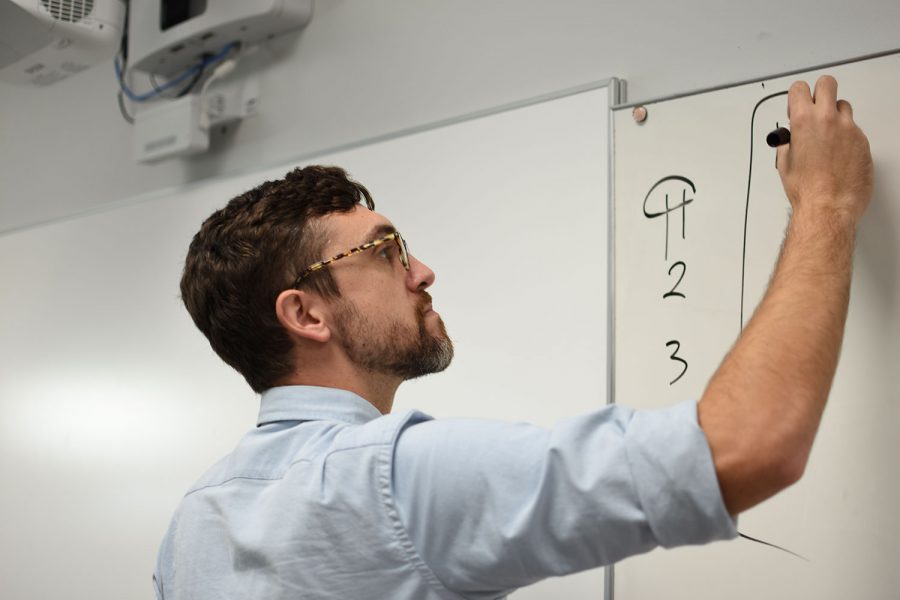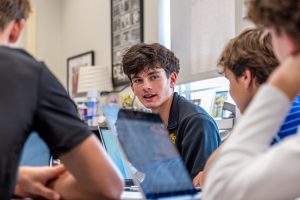From A.P. to RPG
Rather than lectures and PowerPoints English teacher Nick Dressler makes his classroom a video game.
December 10, 2018
In classroom 218, A.P. English students are all playing a newly released role-playing game. They team up, converse, argue, and debate over ways to advance in the game. They all work on various different side-quests and games. One student is creating a board game, another records a podcast, and a third is writing a paragraph in order to advance further in the game. By collecting experience points (XP) the class excitedly hurries to finish quests in the game in order to gain levels and gold in the game. While it seems like the students appear to be slacking off, pushing aside their English work in favor of the latest video game, they actually are completing their assigned classwork. The side quests are paragraphs and projects on reading skills and themes, and leveling up actually means writing an essay. Nicholas Dressler, the Senior A.P. English teacher, has modified his class to be centered around a role-playing game, and has rebuilt the stereotypical classroom setting to appeal to student’s interest and engagement.
“I don’t think that the way we were doing it before is necessarily preparing the student to do well after high school as much as it’s getting him good at THIS school,” Dressler said. “I think the system encourages failure as a way to get better. I do not think school in general encourages failure. I think they encourage you to make sure you get everything right all the time.”
Dressler has students pick from a litany of “Side-Quests,” different homework assignments appealing to all different preferences and skills of students. He tailors his classwork and assignments to give students options while completing their work.
“The side-quests add an element of choice so that the students can work on projects or assignments if they feel at least some connection to and can skip ones that they don’t,” Dressler said. “Also it gives the guys an opportunity to learn what they want to learn and achieve the grade they want in the class.”
Dressler has categorized all classwork into different topics all pertaining to skills needed for A.P. curriculum. Listed under every essay, project, and presentation is the A.P. skill that particular assignment will improve, such as Author’s Intention, Opposing Viewpoint, or Symbolism.
“The basis for it is first and foremost to give the student a better idea of what he needs to work on in order to get a better grade or become a better student in this subject,” Dressler said. “Also to give the student the most specific feedback possible.”
Although the class is technically considered a game, this hardly means that the class is just a walk in the park. Dressler believes though his class may be lighter in tangible busy work, it more than makes up for it in critical thinking, analytical, and abstract work. Dressler intentionally leaves a lot of assignments up to student’s creativity and hopes to break the mold of students relying too much on rubrics to guide their work, often resulting in hackneyed and uninspired projects.
“There is a deliberate vagueness of some of the projects, which actually fosters intrinsic motivation because you don’t have these little ‘monkey-bars’ that you can rely on,” Dressler said. “What you’re doing is showing me what you know or how you do something, and I think the process of learning is what is accentuated in this model.”
Dressler said that this new model has improved the way students think and work in class, and he has seen a direct improvement. Dressler has confidence in his new class, and his students feel the same way.
“I think the class is wonderful,” senior Ethan Aronson said. “Good teaching skills with a great teacher. I think [The new class] shows that Mr. Dressler is willing to think outside the box to engage his students.”










